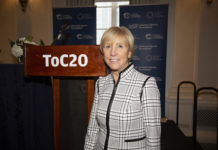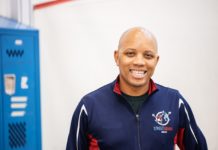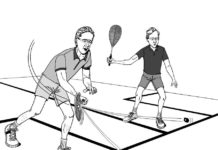Bryan Patterson, Director of Squash, CitySquash
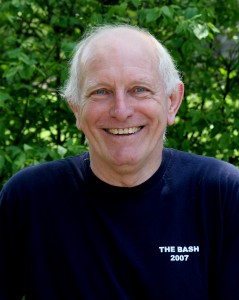 Where and when did you start playing squash?
Where and when did you start playing squash?
I started playing when I went to Barnard Castle School, in County Durham, England, in 1957 at the age of 12. Just as a point of interest both Peter Robson (Amherst Coach) and Stuart LeGassick (Brown Coach) both went to the same school, at a later time.
Who first taught you the game?
We had a teacher at the school who brought all the same grade to the courts—we had two very old cold courts stuck out in the middle of the playing field—and all he did was have two older pupils play while he explained the game. He never actually coached anyone. He never got on court.
Who were your biggest influences?
Definitely my mother, although she never played squash and only saw me play a handful of times, and Jonah Barrington—“Mr Squash” as he was known in the 70s. Without me knowing it he actually saw me win the Drysdale Cup (the unofficial BU19 World Championships in those days), and after University we met and he encouraged me to play and to become a Professional Squash player.
My mum encouraged my sister and I to play sports, and I certainly remember her getting us both out on the local tennis courts, kicking soccer balls around with us and generally helping us just to play and enjoy any sport.
Discuss your competitive playing career?
I was the youngest player to play for my school team—only five players on a team in England. As I have said above I won the Drysdale Cup as an under 19 player. I went off to University and played locally in the York leagues. When I came out of University that was when I met Jonah again and he basically said that I should play squash, which I did.
I represented England in the inaugural European Championships and played for England in the home countries Championships (v Scotland, Wales and Ireland). Played for GB in the World Team and Individual Championships ’73—we were 2nd in the team event and I got to the final of the World Individual Champs unseeded and being a qualifier. I beat our own No. 1, John Easter; the South African No. 1, Roland Watson; the Australian No. 2, Dave Wright; and lost in the final to the Aussie No. 1, Cameron Nancarrow. Getting to that final really kick-started my professional career and I turned Professional in 1974 and was one of the founding members of the PSA (called ISPA in those days—the International Squash Players Association). I reached a high of No. 16 in the World and No. 2 in England.
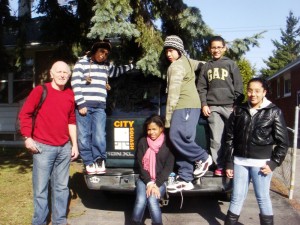
How did you get involved in squash in the United States?
I had been the England Assistant Junior National Coach from its inception in 1973 with the then first England National Coach, Tony Swift, and continued to be in this position until I came to the States. So I guess, unbeknown to me, Peter Robson knew this and he also knew that a position at the Heights Casino would be opening up. He invited me to coach at a Camp at Amherst in the summer of 1991 and again in 1992. He said that I should consider the position when it came up. I did and really thought that this would be a great opportunity for a free trip to New York and that that would be it! I came on the interview which was over a few days and I had to coach individuals, and groups of adults and juniors. I think he gave me a hard time too! I went back to my Club, the Lee-on-Solent Tennis and Squash in England and really thought no more about it, until a letter arrived offering me the position. I knew the game in the States was changing and that this would be a great opportunity to be involved not only at the Heights Casino but with the game in general. So I took the position at The Heights and also got involved with USSRA (as it was in those days) junior squash. I started the National Junior Squads, helped inaugurate the High School Team Championships with Melisa Justi and started the “Battle of the Border” (US juniors v Ontario juniors) with Mark Sachvie.
What Clubs have you worked in here?
As I have said above I started life in the States at The Heights Casino, a terrific family Club with a huge reputation for its great junior program; a terrific introduction to squash in the States. I was there for seven years and then moved to Philadelphia to start a Club at the Chestnut Hill Academy. I built the Squash Club @ CHASS up and brought in some great squash Pros—Mike Jefferys, Tina Rix, and Joe Russell. I spent seven years at CHASS and then moved to CitySquash—I guess that I might have a seven year itch!
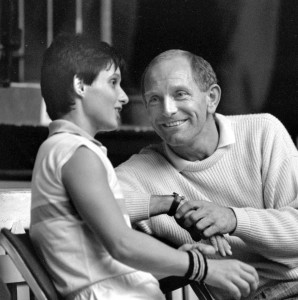
How did you get involved with Urban Squash?
It was Brian Mathias’s fault! Brian told me about the position at CitySquash and I was sort of interested. In the summer of 2007 I was in Spain with kids doing the European tour and Tim Wyant brought Freddie Hernandez over to link up with Brian Mathias. I was impressed with Freddie, but was bugged EVERY day by Tim to “Take the Job!!!” At the end of the week Tim left, but I got to thinking more about CitySquash. I had also had kids from other Urban programs come to Universal Squash Camps in England, and knew them well.
What are the greatest challenges and rewards facing urban programs?
The greatest challenges are making sure that once you have a talented urban kid, who might be on the edge of staying with the program or not academically inclined, it’s convincing them that squash is the sport for them. The other challenge is convincing the kids that academics are as important and maybe even more important than squash. Without academics these kids will not get out of their situations. I hope that helping them become good squash players also helps give them a certain awareness that hard work in all fields will pay off.
What do you see as the future of Urban Squash?
There are more and more cities in the States that are thinking of developing Urban squash programs, obviously finance is key, but for me getting more urban kids to play is key. Maybe by doing this we will also get their parents to play too. Certainly as more and more Urban facilities are built, it would seem a great shame that they are only used by the kids. I would hope that parents would be allowed to come use the facilities as well, so that they get to play and appreciate what their kids do. Also these new facilities might be the ones that draw in the middle income earners and so connect each end of the socio-economic spectrum in squash.



